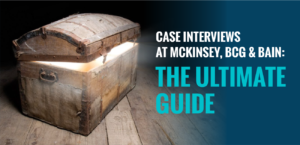
One dimension that causes many candidates to fail at case interviews is numeracy.
You don’t need to be a human calculator to work at a Top 3 consulting firm and most interviewers won’t give you extra credit for being able to do quick mental math.
But, you do need to be familiar with common arithmetic problems and follow a few of the following unwritten math question ‘rules’ to ensure you can solve the questions reliably and confidently.
Brush up on common arithmetic problems
The numerical problems you’ll face only require high-school level math knowledge. However, you do need to be able to solve these problems reliably and confidently, with only a pen and paper and with someone looking over your shoulder. In this situation, any insecurities or deficiencies will be magnified.
Fortunately, the math questions within case interviews are often only one of five types. To make sure you’re prepared for the vast majority of the potential questions, be sure to brush up on these five common arithmetic problems:
- The four operations: addition, subtraction, division, and multiplication
- Fractions
- Percentages and percentage changes
- Breakeven
- Equations with one variable
We advise practising these types of problems regularly. Our Interview Prep Course includes Math Drills to help you do just that and hone your numeracy skills.
Lay out a clear approach
Many candidates botch math questions by getting lost in their own work. They quickly jot down a few operations in the corner of their paper. And, as they progress through their calculations, they can’t make sense of what they’ve written.
To avoid this, start every math question with a new piece of paper. Write down the numbers carefully (what they represent, their unit) and legibly. Then, lay out a clear approach that shows the calculations you’re going to make.
If you do this, you will be less likely to get lost and will be able to spot your own mistakes.
Keep your interviewer in the loop
Many candidates behave as they would rather solve math questions alone at their desk. They stay silent and keep their paper close to their chest.
This is not a good strategy. Leaving your interviewers in the dark will prevent them from signaling when you go off-track. If you conceal your work from them, they’ll conclude you’re hiding a weakness or that you lack confidence in your own abilities.
Instead, walk your interview through your calculations. And, don’t forget to state how the results inform your overall answer to the case question.
Don’t try to be a fancy pants
Many candidates try to outperform by doing complex mental math quickly. There is little upside to this—they don’t get extra points for it. But, there is a clear downside in that they are more likely to make mistakes.
Make sure to calculate all non-trivial operations on paper. Your interviewer won’t mind! And practice these operations so you can do them quickly and reliably.
Subscribe to CaseCoach
For more free tips and strategies to help you land an offer from McKinsey, BCG and Bain, sign up to our newsletter below and get our best free content right in your inbox.






